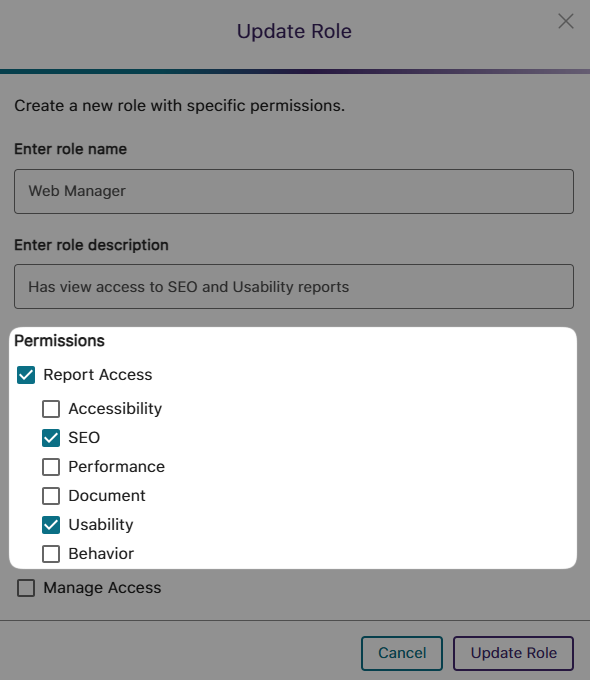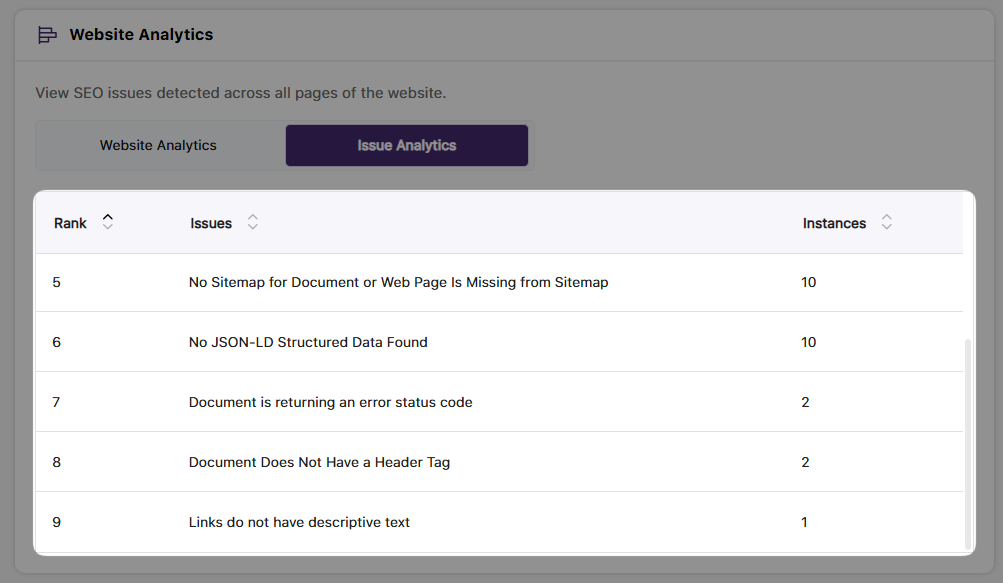EqualGround Accessibility Governance Platform Update – November 2024
The release provides keyword search ranking evaluations, the option to use AutoPilot and Structural Remediation Add-ons for documents, a new Usability Engine to evaluate the text content quality and validity of links, new Behavior Engine to track visitor analytics, a YuJa EqualGround browser extension for web page scanning, the option to specify report access for different roles, a new Accessibility Best Practice metric to enhance web content accessibility, and more.
- Evaluate How Keywords Affect Website Search Rankings With the Keyword Discovery Report
By integrating Google Search Console with YuJa EqualGround, you can generate the Keyword Discovery report, which helps determine how keywords are affecting website search ranking. The report can be categorized into four distinct groups:- Quick Wins: View words with the highest potential to drive traffic to your website.
- High Impact: The most searched keywords that can significantly improve your website’s ranking.
- High Performing: keywords with the most increased rankings to your URLs in the last 30 days.
- Setbacks: Keywords that have decreased your URL rankings within the last 30 days

- Use AutoPilot to Resolve Accessibility Issues in Documents
When assessing accessibility issues in documents found on your website, AutoPilot can automatically fix supported accessibility issues directly within the original document, ensuring the document does not need to be manually fixed and re-uploaded to your website. AutoPilot can remediate documents in DOCX, PDF, PPTX, and XLSX formats, addressing issues such as:- Insufficient contrast between foreground text and background.
- PDFs that are not tagged properly for screen readers to interpret
- Difficulty in reading text due to small font sizes.

- Use Remediation Max for Advanced Structural Remediation of PDFs
Remediation Max provides in-line structural remediation to help fix a wide set of accessibility issues across PDF documents. These issues include:- Fixing the reading order of content by dragging and dropping elements into the correct reading preference.
- Updating the type value of elements to ensure they are recognized correctly by screen readers.
- Changing the language of elements so that they are read aloud correctly by screen readers.

- New Usability Engine to Evaluate the Quality of Text Content and Validity of Links
EqualGround offers a Usability Engine that evaluates websites based on three essential metrics to ensure they are user-friendly for viewers.- Readability: Whether your web content is for young adults or academic professionals, YuJa EqualGround provides a customizable readability checker. You can choose from six standardized methods to assess readability, such as the Automated Readability Index and the Coleman-Liau formula. After selecting a method, a grading scale can be selected to determine the maximum readability level suitable for your audience.
- Spelling: YuJa EqualGround offers a built-in standardized American-English spell checker with the option to add words to your own customizable dictionary. As we continue to develop YuJa EqualGround, we will offer a wider range of languages.
- Valid Links: All links on scanned pages are checked to ensure errors are not received.

- New Behavior Engine to Track Analytics for Website Engagement
The Behavior Engine monitors several key metrics to analyze visitors to your website. These issues include:- Total Visit: The number of visitors to your website.
- Bounce Rate: The percentage of visitors who leave your website without taking any action.
- Referrals: Visits to your sites from links that have appeared on other websites.

- Download the YuJa EqualGround Browser Extension to Run WCAG and ARIA Checks for Web Pages
With the launch of the new browser extension, you no longer need to be on the YuJa EqualGround platform to run your accessibility scans. On YuJa EqualGround, you can access Configurations > User Setup to install the extension and connect it to your platform. Once connected, the accessibility scan can be initiated for your desired web page listing all WCAG and ARIA issues and steps to remediate them.

- More Granular Role Management Capabilities for Reports
As an administrator, when creating a role, you can specify particular reports that the role will have access to rather than granting access to all reports. This allows for roles to be specialized in one or more areas of web content improvement.

- Follow Our Best Practice Guidelines to Make Your Website More Accessible
In addition to the Accessibility Report’s ability to detect ARIA and WCAG-level issues, YuJa EqualGround is offering more ways to enhance web content accessibility by providing a score based on our recommended Accessibility Best Practices. These best practices include detecting issues such as:- Any content on a website that is hidden behind tabs or within accordion components in the site’s design.
- Images that contain duplicate labels.
- Landmarks on a website that do not contain a unique name or role.

- More In-Depth SEO Crawling by Including Six New Areas of Improvements
We have improved our SEO crawling engine to include six new areas where we verify that your website adheres to the latest SEO best practices. The SEO crawler will check for:- Open Graph Tags: Determines how URLs will appear when shared on social media platforms.
- JSON-LD Structured Data Tags: Provide organized, standardized, and machine-readable information about a web page.
- Sitemap: Provides details about the pages, videos, and files on your site and how they are related to each other.
- Internal Links: Checks for the number of internal links on your website.
- Redirects: Checks for the number of links that direct to another website.
- H1 Tags: Determines the topmost heading for your web page.
- Alt Text: Text that represents visual images.
- Viewport Tags: Tells browsers how to control viewport dimensions and scaling.

- Choose the WCAG Conformance Level Your Organization Requires
Your organization can now select the desired level of WCAG conformance to ensure that their websites meet accessibility standards. In the Website Settings, you can choose whether your organization prefers Level A, Level A and AA, or Level A, AA, and AAA accessibility standards for detecting issues.
- More In-Depth Detection of WCAG and ARIA Accessibility Issues
We have added more than a dozen accessibility checks for WCAG and ARIA-related issues. Some of these issues include:- Elements should have visible focus indicators so users can easily see where they are on the page when they navigate using a keyboard.
- Lists on a web page should be structured correctly, specifically to ensure that assistive technologies can interpret and present the content accurately.
- Ensure ARIA labels do not have redundant roles, as their implicit role defines their function.

- New Filters to Organize Accessibility Issues by Their Components or WCGAG Criterion
We have provided two new filters to the Accessibility Issues panel, allowing you to select whether to view issues by their WCAG criterion or to group issues by their component. The WCAG criterion filter will highlight the issue detected, along with the items affected by the issue. In the new component view, you will be able to see all issues within a related category in one view, including all link, checkbox, list, and button issues displayed in their respective viewport.
